
14 minute read
Center of History and Culture
Gone Virtual
Virtual offerings have been explored by the Center of History and Culture, and attempted, on a variety of occasions in the last decade. Previously, those attempts were very hit and miss. Also, sharing our sacred culture and dear history over the internet has always raised a level of concern for the dignity of our traditions. Some stuff is just meant to be learned in person! However, social distancing gave us no choice and the decision was made to move forward with cultural workshops via Microsoft Teams, pending community stakeholder approval of course. After consulting with the Traditions and Repatriations Committee and informing them of our intentions, the committee agreed with moving forward and offering limited cultural teachings via Teams. Both the Culture Program and the Youth Culture Program organized and offered several virtual classes on a biweekly basis. We were fortunate to have several community elder’s agree to participate and offer their teachings. Also, we were especially fortunate to have reached our Out of Service Area citizens! Another common cheer of joy came from the citizens who felt more comfortable learning about their culture from the comfort of their home. The Center of History and Culture is working to offer regularly accessible digital recordings of permissible teachings into the future!
Director, Marcus Winchester

ėthë kenomagék

WHERE TEACHING IS DONE
Basket, Artist Unknown
Zisbakwtokan
Tapping a portion of the maple trees on Roger’s Lake campus has become a staple for the Center of History and Culture in the last half decade, and we weren’t going to let the pandemic stop that! Cultural Activities Coordinator, Nicole Holloway, worked tirelessly to offer citizens the chance to experience and learn about Maple Syrup and Sugar making despite the social distancing restrictions. Taps are offered to the citizens every year if they want to try their hand at boiling the sap from the maples in their yard. However, in 2021 we threw in more goodies with the taps. Nicole recorded the entire process of tapping the trees, boiling the sap into syrup, heating it more until it crystalizes into sugar, and everything else in between. With the help of IT, Nicole produced the video’s herself and they were made available on digital platforms so that citizens could follow along even more closely from home. It also goes without saying that the syrup Nicole harvested on behalf of the community was suburb quality, per usual. The syrup was first offered to Elders, and then made available to remaining Pokagon Citizens. Great job, Nicole!
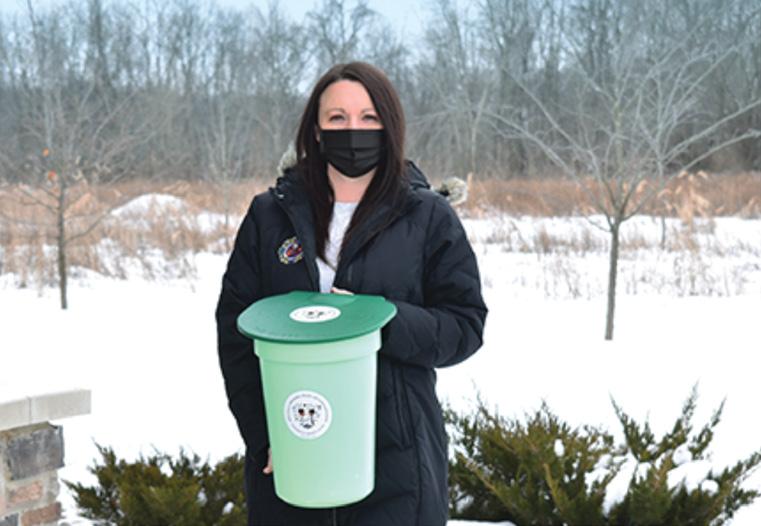
Nicole Holloway, Cultural Activities Coordinator
Photograph provided by Leader Publication, Sarah Culton.

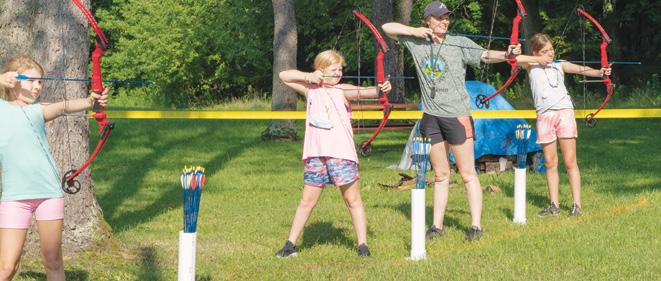



Kë gbéshmen
Our children took the hardest hit with the pandemic and the limitations that it put on all of us. Interaction with friends just isn’t the same when its not face to face, and virtual classrooms can take a hike! No strangers to dedication and commitment for our future generations, Youth Cultural Coordinator Rebecca Williams, and Youth Services Coordinator Daniel Stohrer, went straight to work with the Department of Education’s Susan Doyle and Kristie Bussler to begin planning for Ke Gbeshmen (Lets Camp!) 2021. Hats off to Dan and Becca for the many obstacles that they, along with Susan and Kristie, hurdled! Just when things seemed smooth and the planning team had figured out how to safely offer camp, our beloved Task Force would throw us another wrench. Thankfully, the Task Force was willing to play catch. Dr. Morris, Deputy Chief Bradley, and several others from the Task Force worked hand in hand with the Ke Gbeshmen planning crew to thoroughly consider the safest way to offer Ke Gbeshmen for our youth. Tribal Attorney Paul Shagen offered his expertise and revised the Camp Code to the Ke Gbeshmen planning crew’s, and the Task Force’s, expectations. Nerves were a bit high because this was going to be the Tribe’s first in-person sponsored event on property since social distancing had been put in place. Igwyien to the fine professionals that assisted us because it all paid off and Ke Gbeshmen 2021 moved forward as planned! While it was very different, the youth were able to visit their relatives and friends while celebrating and learning about the beautiful Potawatomi way of life, just like it’s supposed to be. While attendance was reduced for safety, it allowed for a more intimate environment and the opportunity to try new activities and workshops for implementation in future years. Ke Gbeshmen 2021 was certainly a success worthy of applause to the individuals in the Pokagon Government that honored the duties of their positions in assisting us, and of course to Dan, Becca, Susan, and Kristie for their commitment to the future generations of this great Nation.
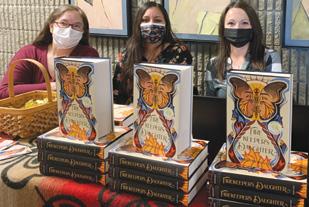
A lot of people picked up new books to read during the pandemic’s social distancing restrictions. A lot of those people picked up Angeline Boulley’s (Ojibwe) New York Time’s Best Seller, The Fire Keeper’s Daughter. It’s no wonder that the Culture Program’s Nicole Holloway thought it would be a great idea to collaborate with the Department Social Services (Casey Casper-Welles) and the Department of Education (Kristie Bussler) to bring in Boulley to discuss her book, and she was right! Boulley is a former Director of the Department of Education for our tribe and resides locally. Boulley jumped on the opportunity and was delighted to accept the offer. Since the program was offered during October of 2021 and social distancing was still in effect of Pokagon property, we opted to host the event at Southwestern Michigan Community College because of their more relaxed restrictions. Despite the relaxed restrictions, Nicole worked with the Center’s Director to ensure that the event was held to the Pokagon Government’s standard of safety. The event was a huge success and Angeline spoke to a full house. Angeline honored the crowd with her humility before she spoke by acknowledging all the familiar Pokagon faces that she saw in the crowd, and how that made her more nervous than being a nationally celebrated author in-front of crowds many times larger. Not nervous in a bad way, but nervous because of the respect she holds for the many Pokagon Elders that showed up to hear her speak. Igwiyen Nicole, Casey, and Kristie!
Youth Mentorship Program

The community is very fortunate to have Mr. Daniel Stohrer serve the tribe as our Youth Services Coordinator. In his position, Dan serves as a mentor for youth in the tribe to ensure that they have access to all of the tribe’s resources for success, and most importantly access to resources to learn and experience their culture. Very early in the pandemic Dan made it a priority to advocate amongst his team the need to be innovative and find a way to serve the citizens despite the struggles of social distancing. His steadfast determination led him right back to where he started, but in a good way. Dan held firm that face to face interaction was the only meaningful way to fulfill his duties to the community and our youth. As such, Dan worked with the Center’s Director to identify the safest way possible to continue his home visits in person with social distancing in place. Dan’s commitment paid off and he began resuming in person visits outdoors, six feet apart, and with masks in place. Because of Dan’s courage to uphold what he felt was right on behalf of his youth mentee’s, Dan was able to provide and enhance meaningful relationships and connections with his mentee’s when they certainly needed it the most. The future of the tribe is blessed to have Dan working to ensure that the Youth Culture’s Mentorship Program participants aren’t restricted from the meaningful relationships that they deserve. Igwiyen, Dan!
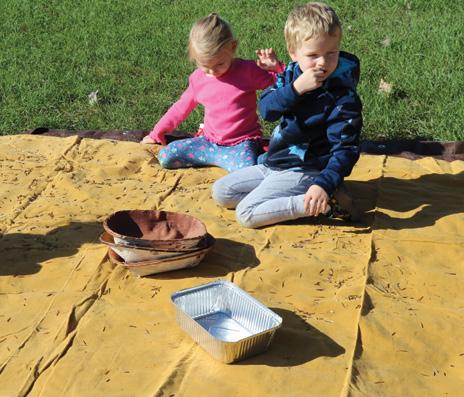
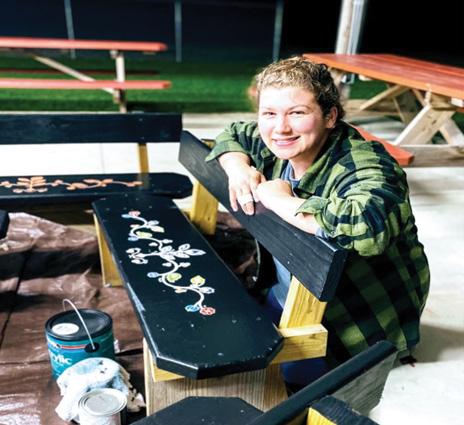

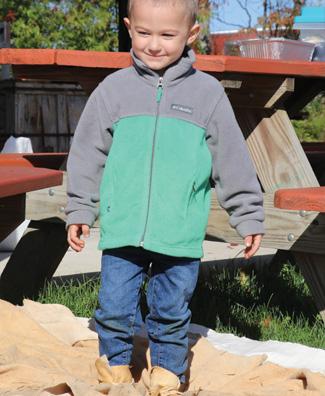
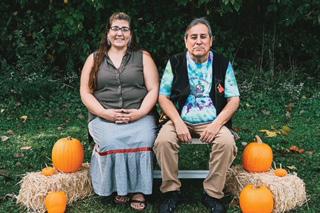


Zagbëgon
Many have agreed that the health pandemic and its restrictions have been a blessing in disguise. For the Youth Culture Program this was especially true. Online participation dropped significantly once the warmer months came, and for obvious reasons. We don’t want to be behind a computer on a beautiful summer evening either. The limitations placed on what could be reasonably offered by the Youth Culture Program turned into a hyper focus on what we knew had been approved to move forward regardless. The blessing revealed itself as the summer came to an end and the Youth Cultural Coordinator, Rebecca Williams, was preparing for her cultural supplementation activities at Zagbëgon. Pre pandemic times, Becca only had enough time to spend an hour or so with the students three times a week. Zagbëgon being a passion of Becca’s, and with restrictions in place regarding the coming and going of visitors and their interaction between multiple classrooms at Zagbëgon, Zagbëgon’s Manager Elizabeth Rinehart and the Center’s Director agreed that Becca’s position would be best leveraged with increased hours in the classroom. This also allowed Becca to supplement and work side by side with Zagbëgon Elder and Nigan Mesho (Lead Granddaddy), Donald “Powwow” Sumners. This has allowed Becca the time needed to focus more in depth on creative methods to instruct cultural teachings to the precious students at Zagbëgon. Simultaneously her and Mesho Donny have engineered several genius ways to share culture with the students in a way that is meaningful to them. Since taking on her responsibility at Zagbëgon with commitment and dedication, Becca has provided countless hours of service to the students at Zagbëgon, whether school was in session or not. One fine example is the refurbishing of the long house benches that the students sit on during lodge time. Becca and her sister, Jennifer Marcussen, painted beautiful Neshnabe floral designs on the benches in their nonexistent free time. Thanks to them, the students at Zagbëgon will grow up with a rich understanding of what beautiful Neshnabe artwork entails whenever their childhood memories of Zagbeon are relived. The future of our tribe appreciates your ingenious contributions and duty to your job and our children, Becca!


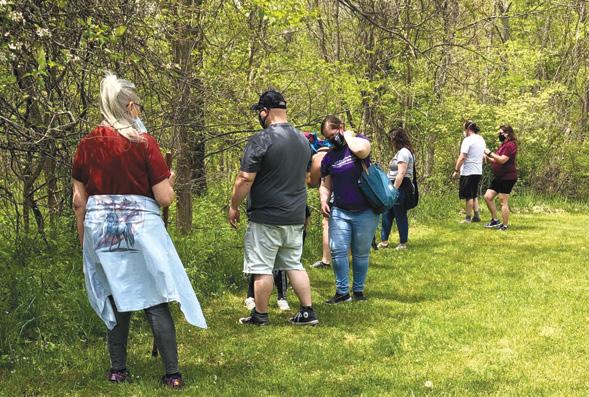

Basket, John Pigeon
Traditional Medicine Program
Our ancestors were given the special gift of plant knowledge as a means of sustaining a healthy body and mind. Some knowledge of the medicinal uses of those plants were kept alive in some of our families, and unfortunately a lot of them weren’t. The pandemic ignited a wave of new interest amongst a lot of people for “alternative medicine.” That term is jarring because at the Center of History & Culture we believe Medicinal Plant Knowledge should be the standard of preventive care for all the families in our community. That’s why we are proud to have continued the Traditional Medicine Program for in person appointments for the entirety of 2021. Traditional Medicine Practitioner, Keith Smith (Red Lake Ojibwe), is no stranger to diseases having practiced Traditional Medicine at several Indian Health Center’s throughout the Great Lakes for the last decade of his life. In addition, Keith brought with him a standard to follow because of his familiarity with pandemic protocol from the other tribal communities that he currently helps. In addition, the Center’s Director worked with Dr. Morris, Chief Deputy Bradley, and Tribal Attorney Paul Shagen to draft guidance and waivers to permit sweat lodges, a critical ceremony belonging to our people that cleanses our bodies of toxins and trauma alike. The need was demonstrated, and met, as every month the men’s and women’s sweat lodge was in full attendance of community members seeking the balance, peace, and health that comes from our sweat lodges. It also needs to be noted that the Pokagon Government standards of pandemic health and safety were prioritized more than once by Keith and the Center’s Director when the sweat lodge was canceled due to a spike in cases regionally. We appreciate Keith’s dedication to helping the people stay healthy during the pandemic the way it was intended, with our sacred plant medicines.
National Historic Preservation Act
If there’s one thing that didn’t slow down during the pandemic, it was Section 106 Consultation requests! The National Historic Preservation Act (NHPA) requires federal agencies to ensure that their allocated federal dollars aren’t spent on anything that will damage or harm historical and cultural resources. The NHPA also says that (tribal resources permitting) on Indian Trust Land it is the duty of Tribal Nations to uphold this federal law on their lands that are held in Federal Trust, and even their ancestral lands, barring private property, as well. That process of ensuring and demonstrating that federal dollars won’t destroy any of our sacred and historical sites is called a Section 106 Consultation, and each tribe is to vest authority in a Tribal Historic Preservation Officer (THPO) to enforce this law. Our enforcer is Officer Matthew Bussler. Matt takes his duty seriously, and the integrity of our tribe is in debt to him for doing so! Matt always has a neverending pile of consultation request letters to sort and provide response’s for, pandemic or not. However, several agencies took advantage of the slower office activity to tackle large projects that in turn doubled Matt’s workload. Matt received an overwhelming number of requests to review legal binding documents called Programmatic Agreements. These agreements are between the Federal Agency and the Tribe to establish best practices for avoiding any kind of activity that would destroy our sites, and what to do if that were to tragically happen. Matt reviewed every word of every line of every page in every draft agreement sent his way. He dedicated twice the amount of review time as usual on consultation requests, and somehow found time to also work hand in hand with other THPOs in the state to fight the development of a marina in Saugatuck, Michigan at one of the last undisturbed river outlets into Lake Michigan, and to also fight Enbridge Line 5 under the straits of Mackinac. Igwiyen Matt, our sovereignty is in debt to the government-to-government precedence you set on behalf of our future generations!

The Native American Graves Protection and Repatriation Act is yet another Federal Law that the tribe has vested Mr. Matthew Bussler the responsibility to oversee and enforce on behalf of the tribe. There are thousands of our ancestors packed into tiny bankers’ boxes inside dark messy storage rooms at several museums throughout the United States. Just like the Federal Agencies that choose to complete big projects that would end up on Matt’s desk as a result of pandemic related telework restrictions, several museums choose to finally follow Federal Law and work to transfer legal ownership of several of our ancestral remains in their possession over to the Tribe so that we can return them to our Mother Earth. The influx of museums reaching out and requesting us to consult on their Native American Human Remains collections is a good problem to have! It is piled on work that we are pleased and honored to accept in a bittersweet fashion. With the help of the Traditions and Repatriations Committee, Matt continued to bring our ancestors home throughout the pandemic. This community is blessed by Matt’s service to restore the reverence that is owed to our past relatives. This is even more admirable noting that Matt completed these critical endeavors as additional duties on top of the other additional federally mandated consultation duties stemming from the pandemic that are specifically for his actual job title. Great job, Matt! The community and our ancestors are proud of the noble work you conduct on behalf of our Nation’s dignity.






